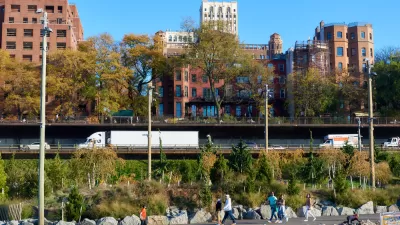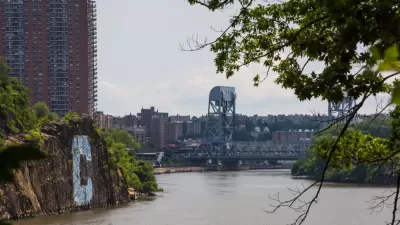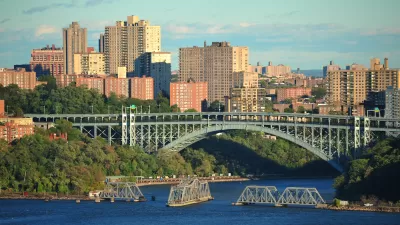The opening of the Brooklyn Bridge Park and other waterfront attractions in New York has many people rediscovering their waterfront. But as this op-ed argues, the waterfront can't be reclaimed as it was never even claimed in the first place.
Looking back at the history of New York' waterfront, writer Nathan Ward shows that the city's relationship with its water has been primarily utilitarian.
"As our waterfront economy slowly faded, New York's piers became a no man's land, blocked off by empty sheds and bands of highway. In the latter half of the 20th century, there was a ghost town between landlubbers and the water.
But in this empty age lay the seeds of recovery. More than 70 years ago, when researchers from Manhattan's Greenwich House interviewed idle West Village dockworkers about ways to improve conditions on the West Side, these men called for the creation of 'opportunities for sane recreation.'"
FULL STORY: Take Me to the River. Finally.

Planetizen Federal Action Tracker
A weekly monitor of how Trump’s orders and actions are impacting planners and planning in America.

Restaurant Patios Were a Pandemic Win — Why Were They so Hard to Keep?
Social distancing requirements and changes in travel patterns prompted cities to pilot new uses for street and sidewalk space. Then it got complicated.

Map: Where Senate Republicans Want to Sell Your Public Lands
For public land advocates, the Senate Republicans’ proposal to sell millions of acres of public land in the West is “the biggest fight of their careers.”

Maui's Vacation Rental Debate Turns Ugly
Verbal attacks, misinformation campaigns and fistfights plague a high-stakes debate to convert thousands of vacation rentals into long-term housing.

San Francisco Suspends Traffic Calming Amidst Record Deaths
Citing “a challenging fiscal landscape,” the city will cease the program on the heels of 42 traffic deaths, including 24 pedestrians.

California Homeless Arrests, Citations Spike After Ruling
An investigation reveals that anti-homeless actions increased up to 500% after Grants Pass v. Johnson — even in cities claiming no policy change.
Urban Design for Planners 1: Software Tools
This six-course series explores essential urban design concepts using open source software and equips planners with the tools they need to participate fully in the urban design process.
Planning for Universal Design
Learn the tools for implementing Universal Design in planning regulations.
Heyer Gruel & Associates PA
JM Goldson LLC
Custer County Colorado
City of Camden Redevelopment Agency
City of Astoria
Transportation Research & Education Center (TREC) at Portland State University
Camden Redevelopment Agency
City of Claremont
Municipality of Princeton (NJ)





























